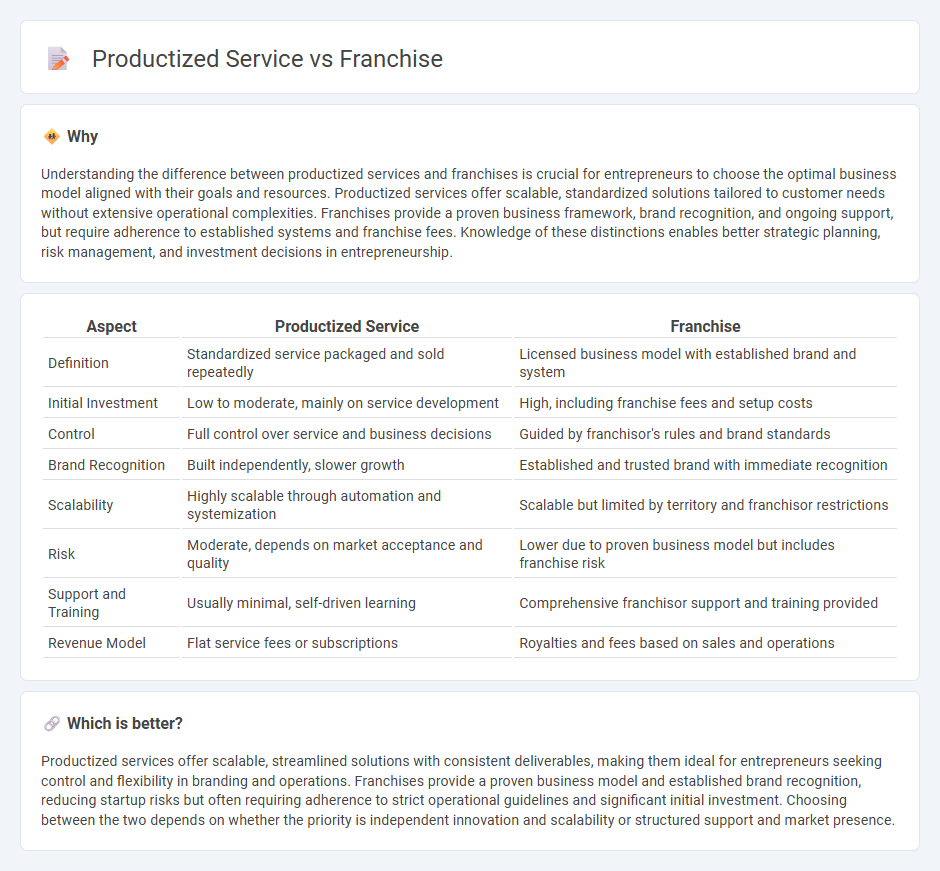
Productized services offer entrepreneurs scalable, standardized solutions with predictable revenue streams and simplified operations, contrasting with franchises that require adherence to established business models, brand guidelines, and often significant upfront investment. Entrepreneurs choosing between these models must consider factors such as control, brand equity, and operational complexity to align with their strategic goals. Explore the nuances of productized services versus franchises to determine the optimal path for your entrepreneurial journey.
Why it is important
Understanding the difference between productized services and franchises is crucial for entrepreneurs to choose the optimal business model aligned with their goals and resources. Productized services offer scalable, standardized solutions tailored to customer needs without extensive operational complexities. Franchises provide a proven business framework, brand recognition, and ongoing support, but require adherence to established systems and franchise fees. Knowledge of these distinctions enables better strategic planning, risk management, and investment decisions in entrepreneurship.
Comparison Table
| Aspect | Productized Service | Franchise |
|---|---|---|
| Definition | Standardized service packaged and sold repeatedly | Licensed business model with established brand and system |
| Initial Investment | Low to moderate, mainly on service development | High, including franchise fees and setup costs |
| Control | Full control over service and business decisions | Guided by franchisor's rules and brand standards |
| Brand Recognition | Built independently, slower growth | Established and trusted brand with immediate recognition |
| Scalability | Highly scalable through automation and systemization | Scalable but limited by territory and franchisor restrictions |
| Risk | Moderate, depends on market acceptance and quality | Lower due to proven business model but includes franchise risk |
| Support and Training | Usually minimal, self-driven learning | Comprehensive franchisor support and training provided |
| Revenue Model | Flat service fees or subscriptions | Royalties and fees based on sales and operations |
Which is better?
Productized services offer scalable, streamlined solutions with consistent deliverables, making them ideal for entrepreneurs seeking control and flexibility in branding and operations. Franchises provide a proven business model and established brand recognition, reducing startup risks but often requiring adherence to strict operational guidelines and significant initial investment. Choosing between the two depends on whether the priority is independent innovation and scalability or structured support and market presence.
Connection
Productized services streamline business offerings into standardized packages, enabling consistent delivery and scalability. Franchises leverage this model by replicating proven business services and operational systems across multiple locations, ensuring uniform customer experiences. This connection allows entrepreneurs to efficiently expand their market presence while maintaining service quality and brand integrity.
Key Terms
Business Model
Franchise business models replicate proven operational systems and branding, enabling rapid expansion with standardized products or services under a unified brand identity. Productized services streamline service delivery by packaging expertise into scalable, fixed-scope offerings, reducing customization and enhancing operational efficiency. Explore in-depth comparisons to determine the best fit for scalable growth and consistent revenue streams.
Ownership Structure
Franchises operate under a licensing agreement where franchisees own and manage individual units while adhering to the franchisor's established brand and operational guidelines, ensuring consistent quality and customer experience. Productized services involve a standardized service offering with clearly defined deliverables, pricing, and scope, allowing business owners to maintain full control over operations without franchisor-imposed restrictions. Explore further to understand which ownership structure aligns best with your entrepreneurial goals.
Scalability
Franchise models rely on replicable systems and brand consistency to scale operations across multiple locations, ensuring rapid market penetration and local customer engagement. Productized services emphasize standardized deliverables and streamlined processes, enabling efficient scaling through automation and reduced dependence on bespoke customization. Explore the key differences in scalability strategies between franchises and productized services to optimize your business growth.
Source and External Links
Franchising - Wikipedia - Franchising is a business strategy where a franchisor licenses its business model, brand, and rights to a franchisee who pays fees and follows obligations, allowing expansion with minimal capital investment by the franchisor.
What is a Franchise - International Franchise Association - A franchise is a licensing relationship where the franchisor provides the franchisee the right to use its trademark and system, along with support like training and marketing, to operate a business.
A Consumer's Guide to Buying a Franchise - Buying a franchise involves paying fees for the right to operate a business under a franchisor's brand, receiving training and support, and agreeing to ongoing royalties and advertising fees.
 dowidth.com
dowidth.com